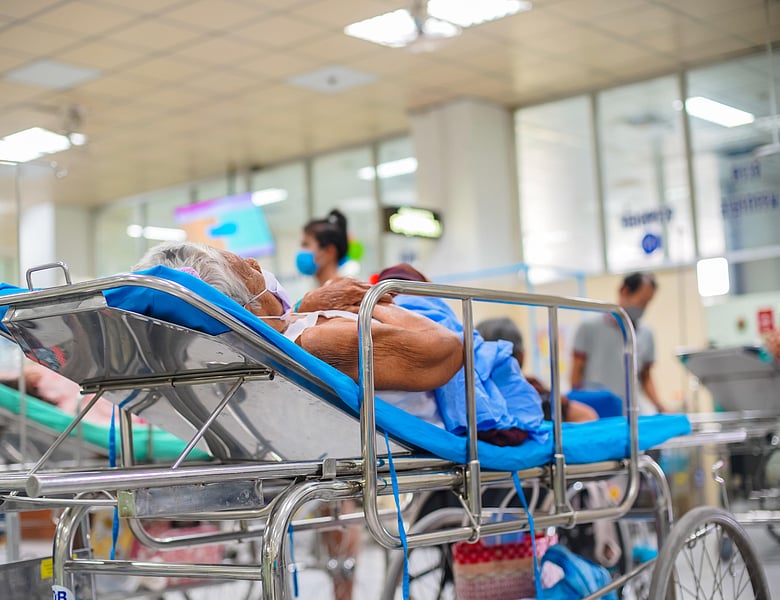Get Healthy!

- Posted October 4, 2023
'Boarding' Patients for Days, Weeks in Crowded ERs Is Common Now
When Hannah, a California marketing professional, showed up at her local emergency room in March 2023 for a pregnancy-related complication, she wasn't prepared for what happened next.
"I arrived at 2 p.m. and finally saw the obstetrics team at midnight,"she recalled.
After an exam, doctors scheduled her for a procedure on the following day, but there wasn't a room available. "I ended up spending the night in a makeshift room in the lobby of the emergency room with a plastic sheet separating me from the rest of the people waiting for attention,"she told reporters at a recent American College of Emergency Physicians (ACEP) briefing.
Unfortunately, this is not rare in U.S. emergency departments. Millions of people a day go to emergency rooms to seek care, but many, like Hannah, end up in a holding pattern due to overcrowding.
This is known as boarding, and experts say the problem is only getting worse.
"We are facing a national public health crisis,"Dr. Aisha Terry, associate professor of emergency medicine at George Washington University School of Medicine and Health Sciences in Washington, D.C., and ACEP's president-elect, said Tuesday. "Emergency departments are overflowing, emergency physicians are overwhelmed, and patient care is at risk."
Research consistently shows that boarding leads to worse outcomes, medical errors, privacy issues and in some cases, death, she said.
Some people spend weeks, even months, waiting to get a room in the hospital or be transferred to an outside facility.
"It's jaw-dropping when you think about the length of time that people are waiting in the emergency department since there is no space to care for them,"Terry said.
Boarding has been an issue for decades, but stresses owing to the COVID-19 pandemic such as staffing shortages and an uptick in mental health conditions have made it much worse.
In a new ACEP poll of 2,164 U.S. adults, 44% of respondents said they or a loved one experienced long waits in emergency departments, with 16% waiting 13 or more hours before being admitted or transferred. Almost half of adults surveyed said they would delay emergency care if they knew they could face boarding.
In all, 42% said hospitals should be primarily responsible for improving the situation, while 17% said Congress should pass legislation addressing boarding. Sixteen percent said insurers should ease cumbersome prior-authorization policies that can result in days-long waits for transfer to a skilled nursing facility.
Nine in 10 respondents consider emergency medical services (EMS) essential, roughly the same percentage who said additional or supplemental government funding for essential services should be a priority.
The poll has a margin of error of plus or minus 2 percentage points.
One health care worker quoted in the ACEP's presentation to journalists said: "Last week our 22-bed emergency department had 35 boarders and an additional 20 patients in the waiting room. Longest boarding time this month was over 200 hours with averages around 70 hours per patient. In addition, we have patients who unfortunately have died in our waiting room while awaiting treatment. These deaths were entirely due to boarding."
Terry told reporters that resource and staff shortages can't be accepted as the new normal.
"We need action now to preserve the safety net for the lives we work every day to save,"she said.
ACEP has suggested creating a regional dashboard of available beds that emergency departments can use when needing to place someone. In addition, reimbursement incentives for hospitals that transfer people to avoid extreme boarding could also make a difference, the group suggests.
Terry added that tuition reimbursement, stress relief programs and suicide prevention services need to be available for health care workers to help address the staff shortages.
Laura Wooster, senior vice president of advocacy and external affairs at ACEP, agreed.
She added that some groups such as kids in mental health crises are disproportionally affected by staffing shortages and emergency room boarding situations.
Addressing the crisis starts with efforts to increase the number of beds available for these kids in the community, Wooster said. Mental health mobile crisis teams can also help reach these kids where they are, she added.
More information
Learn more about the boarding crisis at the American College of Emergency Physicians.
SOURCES: Hannah, marketing professional, California; Aisha Terry, MD, MPH, associate professor, emergency medicine, George Washington University School of Medicine and Health Sciences, Washington, D.C. and president-elect, American College of Emergency Physicians; Laura Wooster, MPH, senior vice president, advocacy and external affairs, American College of Emergency Physicians, Washington, D.C.; American College of Emergency Physicians, news briefing, Oct. 3, 2023




